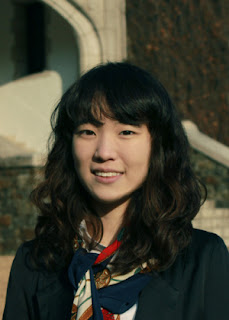Ho-Jung Joo is the ebullient and indefatigable Secretary General of YMUN 2012. Her complicated relationship with YMUN stretches back to the very first conference of 2008, in which she participated as the delegate of Switzerland in UNHRC. In the 2011 conference, she served as the committee secretary of the League of Arab States (LAS), and she's climbed to ranks yet again to serve as the secretary general of YMUN 2012.
1. You’re living history for YMUN.
Living history? Haha. The expression seems a bit exaggerated, but it is true that YMUN has taken up a majority of my MUN experience. I know that many students who will be participating in the upcoming YMUN conference are new to MUN, and I also know how nervous they must be - I was also a rookie when I participated in the 1st YMUN conference. I can still remember how confused I was, preparing for position papers and trying to understand the rules of procedure. But I really enjoyed the experience, which motivated me to participate in YMUN until now!
2. How is this upcoming YMUN different from the YMUN(s) you’ve participated in?
There are two major differences. First of all, we have adapted a theme of "positive peace" that runs through all committees. Although the change the delegates feel may be minimal, adaptation of a unifying theme gives the conference a stronger sense of direction. Unlike past conferences in which delegates in different committees debated with completely different mindsets, now delegates in all committees will bear a shared theme in mind. Secondly, this conference has a variety of committee sizes. YMUN already had many committees that accommodated numbers ranging from 40 to 60 delegates, but lacked smaller committees. So this time we tried to broaden the spectrum by adopting European Union and the Crisis Cabinet in addition to the existing Security Council. Furthermore, an additional committee has been created to the middle school division.
3. What are some highlights of your experience with MUN?
Although performing well during the conference is important, I think the highlight of MUN experience is about getting to meet people that you would not have met otherwise. Last year, I even went to Caribbean Bay with the friends I made during a college MUN conference! Please do not be afraid to socialize - you never know if some of the delegates sitting next to you would end up as your closest friends!
4. What aspect of MUN do you consider most valuable?
To me, MUN has been a place for testing my limits. At first it was difficult to approach other delegates, and it was even more discouraging to stand and talk in front of so many people. Then when I went to College MUN in the United States, I faced a load of other problems such as overcoming prejudices, and persuading other brilliant delegates with my ideas. It was difficult, but I could see myself grow as I fought through those challenges - and there are not many things in the world that is as exciting as that.
5. What do you think are the most important qualities a delegate must possess?
I believe that the delegate who enjoys the most is the best delegate. People may vary in what they enjoy - some might enjoy persuading others, some might enjoy sharing innovative ideas with others, and some might enjoy getting to know new people. It doesn't matter where you derive your passion from; just enjoy - enthusiasm is what drives the debate!
6. Do you have any last words of advice for the participants?
Again, please enjoy the conference. I would not ask you to not be nervous, because I know how it feels. But try your best to reach out to other delegates, delve into your committee agendas, and make this experience yours!
D-17



